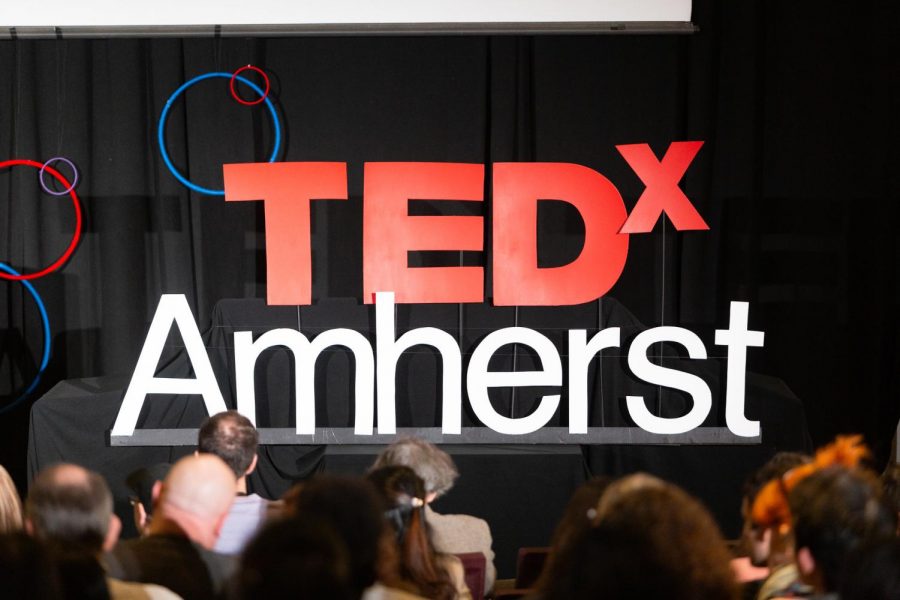(Alvin Buyinza/ Daily Collegian)
Community speakers present ideas at TEDx Amherst
The event was last put on in 2015
April 8, 2019
Trigger Warning: This article contains mention of rape and sexual assault.
On Sunday, students, faculty and other community members gathered at the Isenberg Innovation Hub for a daylong “TEDx Amherst” that featured speakers who presented topics around the theme of “Solve for Wh(y).”
The first section of speakers was titled “y=change.” Of the four speakers, two were professors at the University of Massachusetts and one was a current student.
Kelsey Nass, a sophomore BDIC major, told her story of being raped during her freshman year on campus, and challenged the audience to be more thoughtful about their use of language when talking about rape and sexual assault.
“On a societal level, it is time to think about the power of our words … we use softer, more comfortable terms because it makes our situations not seem as bad, easier to hide from. But I have chosen not to hide,” stated Nass, eliciting a powerful cheer from the audience.
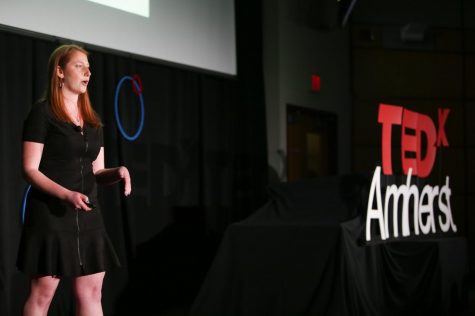
After speaking about the poor feedback she received when trying to implement “educational programs and projects on this campus” regarding rape, she moved on to detail the number of different titles that had been placed on her by her peers and the University: victim, liability and survivor.
“These people visualize me as my past. They see me as my story. And worse, they assume I see myself in the same lens. This label is the softest version of validation,” explained Nass about the label of “victim.”
Nass furthered that, rather than being called a “survivor,” she wishes for people to give her the resources to make change, such as advice, education and a platform.
Nass concluded, “It is time to rebrand your own rhetoric in regard to rape… Look at me and do not feel bad for me and do not feel threatened by me. Stop trying to find me a label, the only person who needs a label is the rapist.”
Also during the morning section spoke Bob Lowry, founder and CEO of “Bueno Y Sano” restaurants as well as an instructor of entrepreneurship at the Isenberg School of Management. Lowry discussed a simple technique that could make listeners more likeable and have their ideas listened to more.
“If we let people finish speaking without interrupting, hold off on advice and ask good questions, people will be more open to our ideas. How? Well, they’ll be more open to your ideas because human nature is to reciprocate,” said Lowry.
He continued: “When the other person is speaking, we’re busy formulating what we want to say. We’re not really listening.” Lowry encouraged audience members to be more attentive to this.
Josh Silver, founder and director of RepresentUS, a non-profit that advocates for election reform and changes to campaign finance laws, also spoke during the first section.
“If we work together, we will manifest a country where politicians put country over party. Where voters matter more than big donors, where we have real meaningful choices when we go to vote on Election Day,” stated Silver, after discussing corruption in government and the loss of democracy.
Also giving a talk in the morning was Nat Turner, a professor in the UMass Education Department. Turner spoke about his experience working with students in Jersey City Public Schools, and how he uses a form of yoga, “Niroga,” to “dismantle the school to prison pipeline, end mass incarceration and begin to heal from the intergenerational trauma that we all suffer.”
After the morning’s set of speakers, attendees were served lunch and given time to participate in two workshops.
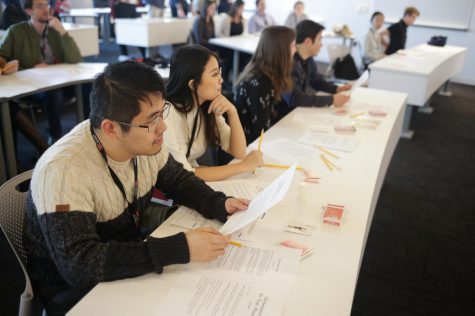
The first workshop, titled “Math is Beautiful,” was headed by Jim Henle, and intended to show participants how math could be considered an art form. The second workshop focused on showing attendees a digital program for creating 3D photographs.
In the second set of speakers, titled “y=discover,” talks consisted of a discussion on new innovations and technology.
“When I was 17, I almost killed someone,” Harith Khawaja said to the audience to begin his talk.
Khawaja, a senior studying computer science and philosophy at Amherst College, told the story of how, while driving above the speed limit and on the phone arguing with his mom, he struck a motorcyclist, almost killing him.
According to Khawaja, this accident was “entirely preventable.”
“Had I not been speeding or distracted by my phone, I would have been concentrated,” he said, citing “human error” for the accident.
In the talk, Khawaja would go on to argue for self-automated cars, vehicles that are able to drive on their own without a human driver.
Humans, according to Khawaja, receive a “dopamine rush” from Facebook posts and that people need to talk or listen to music while driving, making people more susceptible to distractions and more dangerous on the road. Automated vehicles do not face such distractions, Khawaja said.
“By subtracting humans from the driver equation and replacing us with computers, we can make our roads safer for everyone,” he said.
Also speaking during this section was Jim Flynn, a co-founder of the Kuwa foundation, an organization located in Northampton that seeks to develop a new system of identification.
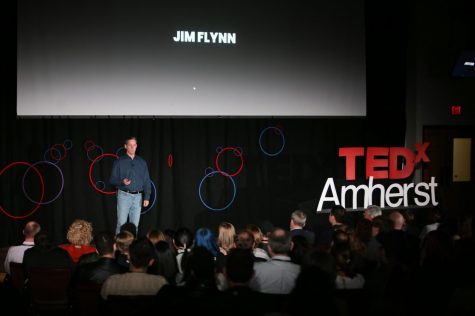
In his talk, Flynn described such an identification system through the use of “cryptographic proof,” a system that would allow people to show identification, such as for buying a beer or using a ski lift, without having to share any personal information.
Duncan Irschick, a biology professor at UMass, spoke on his work with Beastcam technology, which creates 3D images of plants and animals, allowing users to explore models that aid scientists in research and allow the public to learn more about ecology.
“Where I hope to see this go is not just purely a collection, but something I hope that inspires us,” Irschick said.
The final set of speakers, “y=perspective,” featured discussion on new ideas designed to change how the audience thinks and perceives certain ideas.
Livia Rizzo used her time to show how the Harvard Medical School MEDscience program is using a “flipped classroom” to engage high school students.
Through the use of mannequins, the program simulates what it is be like to help patients at a hospital in emergency situations, allowing the students to learn how to “problem solve.” Students will ask questions to the mannequin, which will respond with answers, in an attempt to determine what type of assistance the mannequin needs.
Rizzo, an Amherst alum who currently works for the MEDscience program, explained the value she sees in using a more “role-playing” format that the program uses.
“We don’t need to layout the facts to our students in a lecture format,” Rizzo said. “Rather, let them experience the facts for themselves, discover these facts and from there, a teacher can pick up from there and connect the complex science for them.”
Rizzo used volunteers from the audience to work with a mannequin how students would in the program in a workshop that preceded her talk.
To conclude the section was Henle, a retired mathematics professor at Smith College, who urged the audience to “fall in love with math.”
He told the story of how he taught one of his classes at Smith in which he gave minimal instruction to his students and told them to do whatever they wanted in the hope the students would make their own discoveries.
Henle bases his teaching on confidence he has in people to find the “beauty” in math.
“Each of you was born with the mental equipment to become a genius,” he said.
Also speaking during this section was Michael Sundel, who spoke on how he developed Ophanim, a task-management software, to increase the efficiency of the employees of his philanthropic business he started with his wife.
Additionally, Alice Flaherty, an associate professor of neurology at Harvard, discussed the relationship between danger and creativity and related to her own personal experiences.
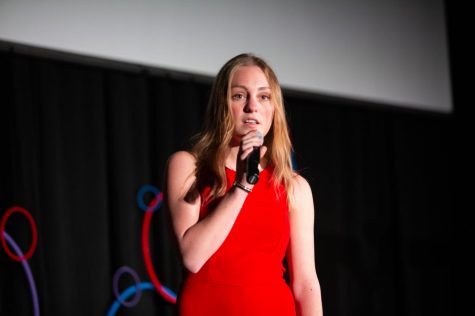
Ruby Ramsay, executive director of the event and a UMass sophomore computer science and math double major, coordinated the TED event along with a team of 14 other students. She stated that she plans to continue putting it on annually and hopes that it continues even after her graduation.
Ramsay added she plans to incorporate a couple of “TEDX salon” events throughout the year. These events would be shorter versions of a TED event and centered around a specific issue.
“I think that would take really well to the audience that we have, this young and old audience that comes in,” said Ramsay.
Irina Costache can be reached at [email protected] and followed on Twitter @irinaacostache. Will Mallas can be reached at [email protected] and followed on Twitter @willmallas.
